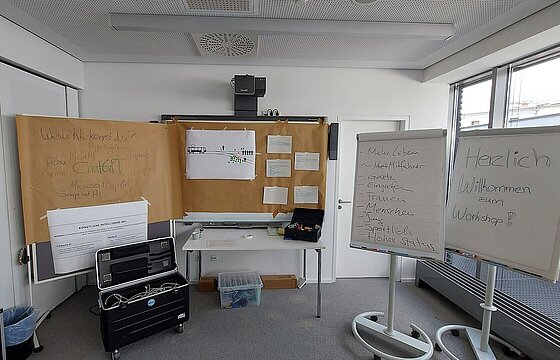Erfolgreiche Durchführung der Schulworkshops "KI & Diskriminierung"

Das Düsseldorfer Institut für Internet und Demokratie (DIID) erforscht die Wechselwirkungen zwischen Digitalisierung und Demokratie. Unser Fokus liegt auf der Frage, wie digitale Technologien – insbesondere das Internet und datengetriebene Systeme – politische Partizipation, öffentliche Diskurse und demokratische Entscheidungsprozesse beeinflussen.
Die digitale Transformation eröffnet neue Möglichkeiten der Beteiligung, verändert Kommunikationsräume und stellt etablierte demokratische Mechanismen vor neue Herausforderungen. Am DIID analysieren wir diese Entwicklungen, untersuchen sowohl Chancen als auch Risiken und entwickeln wissenschaftlich fundierte Konzepte zur aktiven Gestaltung digitaler Kommunikations- und Partizipationsräume.
Unsere Forschung ist inter- und transdisziplinär angelegt: Unter dem Dach des DIID kommen Forschende aus verschiedenen Fachrichtungen zusammen (u.a. Informatik, Kommunikationswissenschaft, Politikwissenschaft, Rechtswissenschaft, Soziologie und Wirtschaftswissenschaften), um gemeinsam an Forschungsprojekten zu arbeiten. In enger Kooperation mit Akteur:innen aus der Praxis setzen wir auf transdisziplinäre Ansätze, um wissenschaftliche Erkenntnisse in die gesellschaftliche Anwendungskontexte zu übertragen.
Ein zentraler Aspekt unserer Arbeit ist der Einfluss digitaler Technologien auf öffentliche Meinungsbildung und politische Diskurse. Dabei spielen algorithmische Systeme und Künstliche Intelligenz eine immer größere Rolle – sei es bei der Moderation von Online-Diskussionen, der Personalisierung politischer Inhalte oder der Erkennung von Desinformation. Wir untersuchen, wie diese Technologien genutzt, reguliert und weiterentwickelt werden können, um demokratische Prozesse zu stärken und Missbrauch einzudämmen.
Unser Ziel ist es, wissenschaftlich fundierte Impulse für eine demokratische Gestaltung digitaler Räume zu geben. Durch empirische Forschung, anwendungsorientierte Entwicklung und den direkten Austausch mit der Praxis tragen wir dazu bei, digitale Innovationen und gesellschaftliche Anforderungen miteinander zu verbinden.
Am DIID forschen aktuell über 50 Wissenschaftlerinnen und Wissenschaftler der Heinrich-Heine-Universität aus unterschiedlichen Disziplinen. Das DIID versteht sich als Dach, unter dem interdisziplinär Projektideen entwickelt und konkrete Fragestellungen rund um das Thema Internet und Demokratie erforscht werden.
Mit seiner offiziellen Gründung am 21. Juli 2016 hat das DIID seine Arbeit als zentrale wissenschaftliche Einrichtung an der Heinrich-Heine-Universität aufgenommen. Aufbau und Organisation des DIID sind in einer Institutssatzung geregelt. Leitendes Organ ist der für zwei Jahre gewählte Vorstand. Die Geschäftsführende Leitung obliegt einem Sprecherteam, dem aktuell Marc Ziegele sowie seine Stellvertreter Stefan Conrad und Ulrich Rosar angehören. Das DIID wird zudem von einem Beirat unterstützt und beraten. Das operative Team des DIID besteht aus DIID-Koordinator Dennis Frieß, den gewählten Sprechern, sowie der Administration und wissenschaftlichen Hilfskräften (Organigramm).